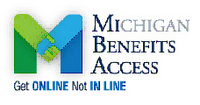Online access to food stamps and Medicaid makes life easier

Haley Manuel Washtenaw Health Plan
Many people turn to public assistance programs when they lose a job, contract an illness, or just need a little extra support. Now, these resources are easier to access than ever before.
The Michigan Department of Human Services has expanded their MI Bridges website to incorporate multiple assistance programs in a single application. Previously, one could only apply online for the Food Assistance Program (Bridge Card or food stamps), but since January 2012, individuals can also apply for Medicaid, State Emergency Relief, Cash Assistance and Child Care Assistance.
To facilitate the implementation and increase awareness of this valuable resource, the Michigan Benefit Access program was created through a public-private partnership between DHS and the Michigan Association of United Ways. Michigan Benefit Access is an initiative that helps connect families to public benefits using the MI Bridges technology to ultimately increase their economic stability. Furthermore, through a grant from Michigan’s AmeriCorps, there are over thirty Community Resource Navigators placed throughout the state to directly support their vision.

In Washtenaw County, United Way of Washtenaw County is hosting two Community Resource Navigators: Haley Manuel at the Washtenaw Health Plan and Kelsey Cauley at Food Gatherers. The Navigators have infiltrated the county, assisting people from Ypsilanti to Manchester, Dexter to Milan.
Krista Nordberg of the Washtenaw Health Plan says, “Our community is incredibly lucky to have Kelsey and Haley, both of whom are motivated to eliminate the hardships of those they come in contact with.”

The Community Resource Navigators serve the community by working directly with clients, connecting with local agencies and attending meetings and events to reach out to more people. Look for the Navigators at locations like Growing Hope's Downtown Ypsilanti Farmer’s Market, the Manchester Community Resource Center, WIC and the Hope Clinic.
The Michigan Benefits Access program not only works to improve access to public benefits, but trains Community Based Organizations to become educated in these programs as well. The Navigators have already brought one Community Partner training to Ann Arbor, and after a great turnout, plan to host more before the end of the year.
AmeriCorps is a national community service program that provides funding to agencies addressing the critical needs in their area. Laura Kilfoyle, AmeriCorps Program Director, reports that “since the Community Resource Navigator Program started in December 2011 AmeriCorps Members across the state of Michigan have assisted 484 individuals with benefits applications, 1,129 people with specific community resources (in person), and 9,092 people with specific resources via the 211 call centers.”
Before DHS began accepting applications via the internet, community members would apply for these programs by mailing in a paper application or turning one in by hand at their local DHS site. MI Bridges breaks through many barriers that individuals may have run into in the past, as they can now submit the streamlined application from any computer with internet.
MI Bridges is the first site used in Michigan that combines multiple DHS assistance programs and give individuals the ability to upload required documents with their application. MI Bridges allows users to set up an account to check on the status of their benefits, view correspondence sent by mail, update their contact information and complete annual redeterminations. Clients can set up a new account and be able to view current and past benefits they have applied for. T
he website is now available in three languages, English, Spanish and Arabic.
For more information on Michigan Benefits Access or MI Bridges, contact Haley Manuel at manuelh@ewashtenaw.org or 734-544-6879.


Comments
annarbormommy
Thu, Jul 12, 2012 : 7:58 p.m.
I appreciate that many people "do without" but I don't believe you can do without something as basic as food and shelter. In order for many people to "pursue happiness" (or achieve financial independence) they need to chip away at the barriers. While you'll always find examples of people taking advantage of the system (everyone knows someone who does something that they use as an example of fraud or laziness for the entire population,) there are at least as many examples of people who access benefits for a limited time while they are experiencing unavoidable circumstances or emergencies. If someone is facing an eviction or a utility shutoff, temporary cash assistance or food assistance can help them stay in their home. If they lose their home, it only increases barriers to employment, education, childcare, etc. If meager amounts of food assistance (and let's be honest here, food assistance benefits are not enough to cover even basic grocery trips) provide enough nutrition for a child's healthy brain development or helps them stay focused in school, that's a wise investment of public funds. The previous system of applying for benefits took forever and involved multiple trips to DHS, sometimes taking an entire day just to be told you were missing a document and had to come back again. Even changing any info on your application (such as change in income) could take a whole day of travel/waiting. Better access to benefits means fewer barriers to all of the other things that need to be done. More time can be spent at work or at school or searching for work or working your second or third minimum-wage job. And streamlining the system also allows overburdened DHS workers to concentrate on making sure benefits get to the people who need it most. And... here's something many people don't even think about - SNAP (food stamp) benefits are dollars that are spent in our local economy. The money comes back to the community because it is spent in our commun
Napalm.Morning
Thu, Jul 12, 2012 : 5:12 p.m.
There are many things that even I cannot afford. . . so. . . I do without. . . The last time I checked we were generally endowed with the right to "pursue" happiness, with no implied or explicit guarantees that we will "achieve" happiness. . . or have it handed to us on a sterling silver entitlement platter. More specifically on point, here, I can envision a scenerio herein where there may be a complaint that someone may not be able to avail themselves of the on-line program administration noted in the article due to lack of access to a computer or to a robust internet connection. . .at which point the "victim" card is "played" and another government program is initiated to ensure that all those on public assisstance will be given a computer and an internet connection. . . all in the name of fairness. . .
bamwow
Thu, Jul 12, 2012 : 2:38 p.m.
Napalm Morning, it's easy to make assumptions about people who don't have health care or access to transportation. But believe it or not there are people that work 2 or 3 jobs who don't have health care benefits. There are people who work full time jobs who don't have access to reliable transportation. Putting people to work the way these Americorps workers are, to spread the word about these programs is a benefit to the entire community. These federal programs are there for a reason, and someday you may need them as well. If you don't already!
bamwow
Wed, Jul 11, 2012 : 5:47 p.m.
What a great way to make our state and federal resources more accessible to people who need them!
Napalm.Morning
Thu, Jul 12, 2012 : 12:12 p.m.
. . . and one less reason for those on public assistance to leave the couch and possibly, maybe consider fending for themselves with say a job! (GASP). . .next thing you know those inside "the beltway" will by executive decree deem computer ownership and internet access a fundamental "right". . . to support fairness for all. . .